- #1 – Victron Energy Orion-Tr Smart DC-DC Charger – This is a compact automotive charger that can output up to 360 watts at 30 amps.
- #2 – Renogy DCC50S 12V 50A DC Board Battery Charger – This is a more powerful 600-watt, 50-amp charger for larger vehicles and solar arrays.
- #3 – REDARC BCDC1225D – This 25-amp charger is specifically designed for off-roading and other demanding applications.
In a world where reliable power is everything, how do you keep your devices and batteries in peak condition? The answer: DC to DC battery chargers.
Essential for anyone relying on battery power, these chargers ensure your batteries are efficiently charged by converting direct current from one voltage to another.
Perfect for vehicles, solar setups, and off-grid applications, they optimize power consumption and extend battery life.
#1 – Victron Energy Orion-Tr Smart DC-DC Charger
The Victron Energy Orion-Tr Smart DC-DC charger is a great choice for light to medium-duty applications. It’s built into a sturdy steel frame that’s designed to be bolted down for installation.
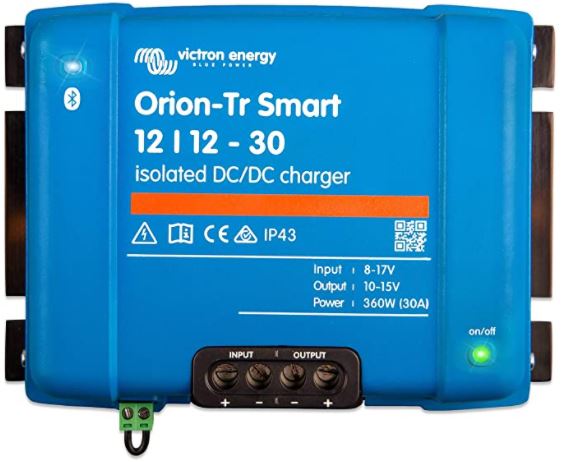
The overall dimensions are 7.32 inches in width, 5.12 inches in depth, and 2.76 inches in height. Much of this height consists of the frame, so the actual unit is a bit smaller. At 3.96 pounds, it’s lightweight and won’t add any significant extra weight.
The Orion-Tr is a smart charger, so it will automatically detect what type of battery is connected. It can be used with lead acid and lithium batteries without the need to change any settings. The overall maximum power output is 360 watts and 30 amps.
However, that can be increased by running multiple chargers in parallel. There’s no reason to do this for automotive purposes, but it’s very effective for solar arrays. Moreover, the Orion-Tr accepts anywhere from eight to 17 volts of input. This makes it useful for alternators, solar panels, and other highly-variable power sources.
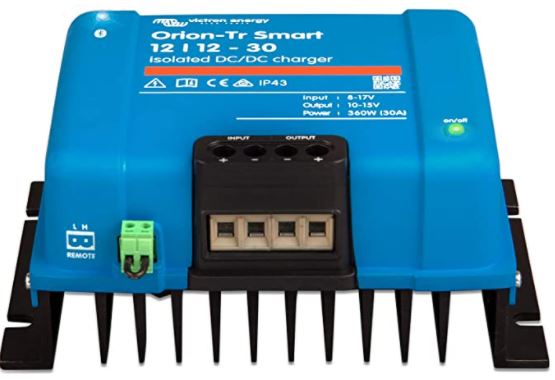
One neat thing about the physical design is the screw terminals. They require only a simple standard screwdriver, so they’re easy to connect and disconnect. You don’t have to use any special tools that aren’t already in your toolbox.
The terminals are all clearly marked, so they’re easy to read. There are also indicator LEDs to let you know when the charger is active, as well as when Bluetooth is active.
Yes the Orion-Tr has Bluetooth. Once it’s plugged in, you can install the Victron Energy app on your phone and control it wirelessly. Through the app, you can program your charger and monitor its status. You can also install a wired remote for a simple dashboard on/off switch.
#2 – Renogy DCC50S 12V 50A DC Board Battery Charger
Renogy is a well-known manufacturer of power systems. The Renogy DCC50S 12V 50A DC Board Battery Charger is another excellent choice.
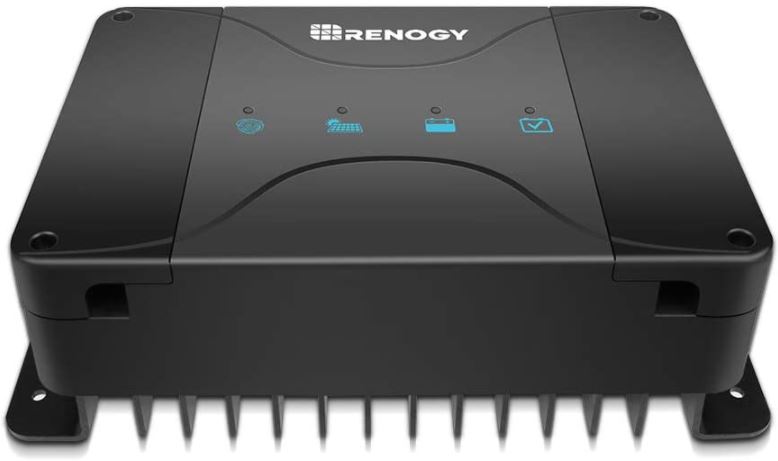
The DCC50S is a bit larger than our first choice, at 9.6 inches wide, 5.7 inches deep, and 3 inches thick. Like the Orion-Tr, it has a built-in steel frame that’s engineered for easy mounting. It’s actually lighter, tipping the scales at only 3.13 pounds. This makes it suitable for racing and other applications where every ounce matters.
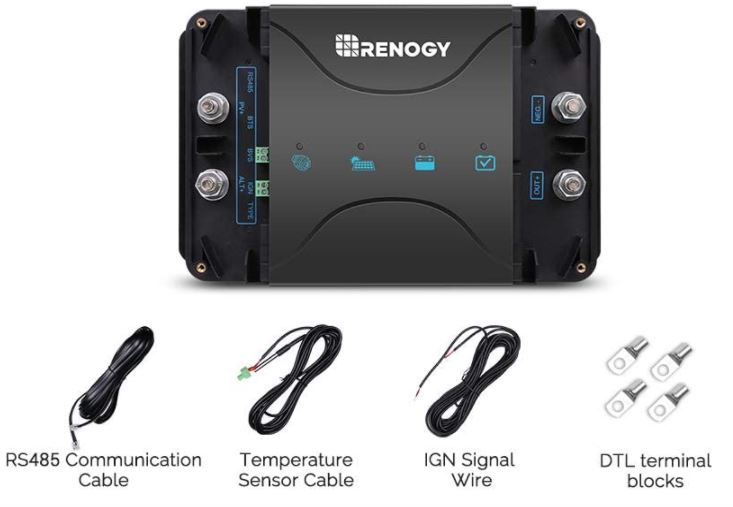
This charger can handle almost every type of battery. In addition to lithium, it can charge AGM, GEL, and flooded batteries. With a maximum output of 50 amps, it’s more powerful than most compact chargers.
Not only that, it sports a full array of safety features. It protects your batteries from over-voltage, overheating, over-current, reverse current, and other concerns. Not only that, but the DCC50S has a voltage sensitive relay that will work well with most alternators.
The DCC50S supports both solar and alternator DC power. For solar, the maximum input is 660 watts at 25 volts. This means you can run 12-volt solar panels in pairs for 24-volt charging. You won’t often make use of this feature in a car, but it’s a huge benefit for off-grid charging.
#3 – REDARC BCDC1225D
Last on our list is the REDARC BCDC1225D. This charger is ultralight, at only 1.54 pounds. It’s also ultra-slim, measuring 10.24 inches wide, 4.92 inches deep, and less than 1.9 inches thick. This makes it suitable for installing in unusual locations, such as the inside of a vehicle door or hatchback. Because it’s so slim, you can put it just about anywhere.
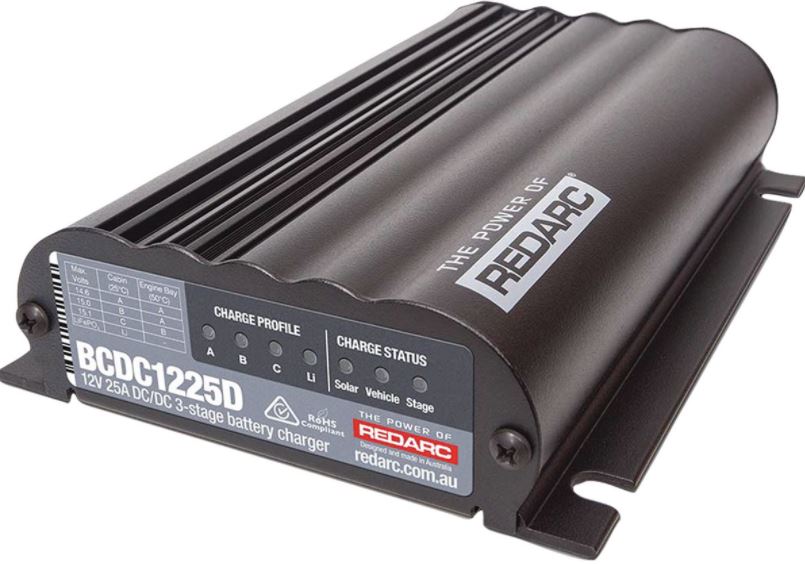
The BCDC1225D falls right in the middle of our last two offerings. It provides up to 25 amps of juice, although it can provide less as needed. In fact, this variable voltage is the REDARC charger’s main attraction. It’s designed to run off your primary battery, not your alternator.
When your secondary battery, it delivers charge as needed. However, when your secondary battery is full, it goes into “float” mode. In this mode, the BCDC1225D stores excess power, and only delivers a slow, 0.5-amp trickle charge.
When more power is needed, this stored power can immediately be delivered without draining your primary battery. This in turn gives your alternator plenty of time to keep up with the increased overall power usage.
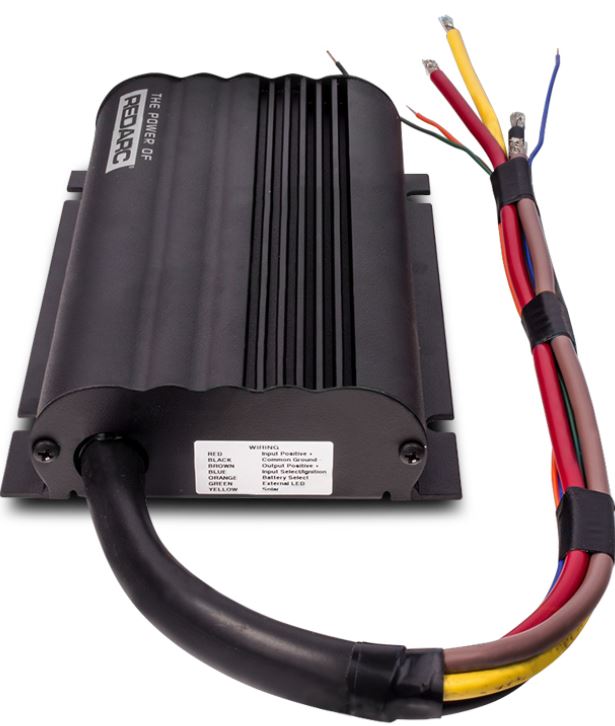
Like the last two chargers we looked at, the BCDC1225D can also operate off a solar panel. It has a built-in regulator, and will automatically deliver the correct charge. As a result, you can connect it directly to your solar panels, without the need for a regulator. All of this is covered by REDARC’s two-year manufacturer’s warranty. In the event of early failure, you get a replacement or a full refund.
Final Verdict
As you can see, each of these DC to DC battery chargers has its own strengths and weaknesses. So, which one is right for you? It depends on what you need. We started out by reviewing the Victron Energy Orion-Tr Smart DC-DC Charger. This charger is compatible with lithium and lead-acid batteries, and supports a wide range of input voltages.
It’s easy to install, easy to use, and easy to control with the Bluetooth app. The 30-amp current might not be enough for some applications. But for your average automotive backup battery, it’s going to provide more than enough power.
The Renogy DCC50S 12V 50A DC Board Battery Charger is a little more powerful, providing 50 amps of power. It’s also a bit beefier, which could make it harder to fit in a smaller engine compartment. That said, it offers a few distinct benefits.
For one thing, it works with state of the art AGM batteries. It also supports up to a 25-volt input, so it’s safe to use on a 24-volt solar system. This is a significant benefit for off-grid use, where power use spikes and zeroes out as people come and go.
The REDARC BCDC1225D is a mid-powered charger that delivers 25 amps. However, it’s also the smartest of the bunch. Its ability to deliver a trickle charge and store extra power makes it useful for systems that are used irregularly. Regardless of when your backup battery is needed, it will be fully charged and ready to go.
Meet Ry, “TechGuru,” a 36-year-old technology enthusiast with a deep passion for tech innovations. With extensive experience, he specializes in gaming hardware and software, and has expertise in gadgets, custom PCs, and audio.
Besides writing about tech and reviewing new products, he enjoys traveling, hiking, and photography. Committed to keeping up with the latest industry trends, he aims to guide readers in making informed tech decisions.

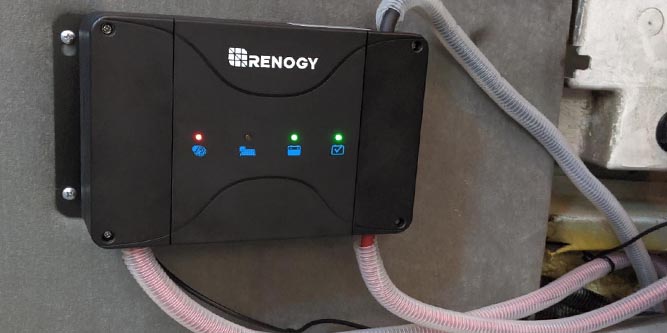
Hi there, I am trying to wrap my head around the need for the dc to dc charge controller. Many vehicles are prewired with 12 volts prelocated at the vehicle trailer connector. Is this power source not already controlled or do I need to still install a converter charger?
The vehicle trailer plug will only supply a very small trickle charge to the RV battery. It is not sufficient to charge a depleted battery and really is only designed to trickle charge an already fully charged battery to assure it does not run down. The wires from the tow vehilce to the RV in the trailer plug are are too small to carry enough amperage to do the job.
Hi, I don’t want to use my drive battery, so I am thinking of using two deep cycle batteries for my caravan. I know it is not good practice to just connect them in parallel, so I have mounted my 350 W solar panels on the roof of my Ranger twin-cab and will park it in the sun. I have 20m of 6ml cable to go from the solar panels to the regulator first in my caravan and then connected to the first battery. My theory is that as I drain power out of the load battery, the first battery will begin to top up the load battery until it is fully charged again, at which time, the regulator will again charge the first battery until it is full. AS I draw more power from the load battery will again be topped up by the first battery and the cycle will repeat.
I am planning to use the Orion 12-112 30A DC-DC charger, but I am not sure if it can take solar panels or not, however as I am installing a regulator in front of the Orion I don’t see why it would differentiate between alternator current and that from my regulator. On the other hand if it also is a regulator it might be a problem. your thoughts and suggestions would be greatly appreciaated.
Thanks Gerry
The output of a 12v solar panel is higher than 12v; it has to be in order to charge the battery. If you buy the renogy thinking that you are going to run in series, it likely will not work because 12v panels run in series will exceed 25 volts, as will a 24 volt panel. You would need a step down converter for either of those scenarios.
Tech Guru, thanks for this post, it was really useful info for me while building out a Sprinter van for car camping.